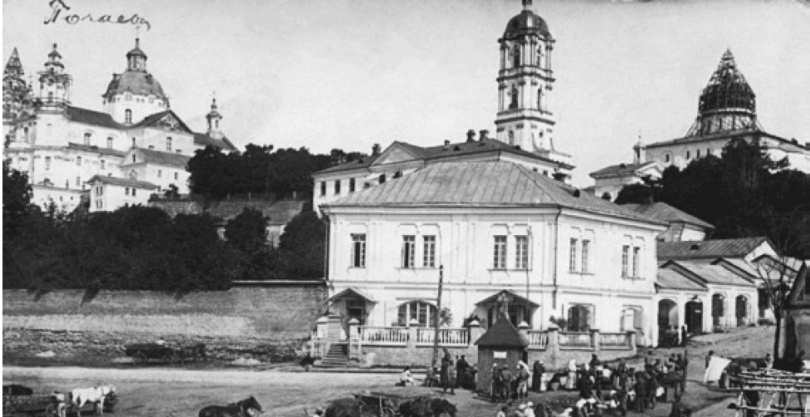From Editor
This piece was written by Bishop Leontii (Turkevich) of Chicago, who later became First Hierarch of the North American Metropolia (now the OCA). It is interesting that it was published during the Second World War, when the Metropolia was cut off from the ROCOR Synod of Bishops, with which communications would be restored in 1945. Bishop Leontii pays attention to a little-known aspect of Metropolitan Antony’s service as Exarch, which has become relevant now in the context of examining the history of relations between the Ecumenical Patriarchate and the Russian Orthodox Church. Metropolitan Leontii (d. 1965) is remembered as a hierarch who led a righteous life. My good acquaintance Archpriest Alvian Smirensky, whom Metropolitan Leontii ordained in 1958 and who served in the Protection of the Mother of God Cathedral in New York, remembered him as follows: “Fr Alvian and his matushka also revered deeply the First Hierarch, Metropolitan Leontii, whom they regarded as a saint. They lovingly remembered his humility (he darned his own socks) and the way he offered practical help to the young family. Matushka used to bring her young son with her in her Saab, as she drove the Metropolitan to the Synodal chancellery at Syosset. She would take the child for a stroll while she waited for the Metropolitan to complete his work and to take him back.” [1] Deacon Andrei Psarev, Archpriest Alvian And Helen Smirensky: “A Long And Happy Life Together” Metropolitan Leontii’s attentive, thoughtful attitude to Metropolitan Antony shows how much more complicated the historical reality was than common notions about the “liberal metropolia” might lead one to believe.
Deacon Andrei Psarev,
August 29, 2020
Five years have passed since the death of His Beatitude Metropolitan Antony in Yugoslavia. He remains an unshakably monumental figure. Yet owing to the circumstances of our time, what comes to mind are less his theological, publicist and homiletic writings, than the areas of his life and work that reflect his active nature and outward (ecclesiastical, societal, universal, and purely political) leadership, if we can put it that way.
In the short survey article published in the October 1936 issue of the Messenger, when the memory of the death of Metropolitan Antony, the officially recognized head of the Russian Church Abroad outside of Soviet Russia, was still fresh, it was difficult to touch upon all the many facets of the Metropolitan’s persona. However, completely passing over those things which were not said at that time would be an affront to his memory and to the history of the Russian Church over the last 3–4 decades. Metropolitan Antony’s work over the course of these decades was too noticeable and important for us to brush over it, even if, both then and now, it might be evaluated in various, even contradictory ways. Here we will keep to the facts.
In our time, missionizing has usually been understood in two different ways in the Russian Church: an ‘external’ mission to the Muslims and Buddhists in the East, and an ‘internal’ mission against sectarianism, Old Ritualism, and atheism. These, at least, were the main topics that were addressed at missionary consultations and assemblies of leaders of the Russian Orthodox Church in Kiev under Metropolitan Platon, Kazan under Archbishop Dimitrii, and in Bisiukov Monastery under the abbacy of Vladyka Arsenii in 1917. Strange as it might sound, there was no anti-Catholic or anti-Uniate session even at the great Church Council in Moscow in 1917–18.
Against this backdrop of, as it were, obscuration or indifference or lack of an official position concerning the mission to Roman Catholics and the buffer they had created between Western Christianity and Eastern Orthodoxy, Metropolitan Antony Khrapovitsky stood out in a highly noteworthy and serious way. Vladyka Antony had come to know the Uniates during his term of service in the theological seminary in Kholm, and had formed a clear, unequivocal view of this branch of Christianity, according to him Roman Catholicism was defined as a heresy, Latinism as a perversion of true Christianity, and Rome as an inheritor of pagan traditions. For him, the pontifex maximus, the Vatican, and the Papal Conclave were a difficult inheritance from Pagan Rome, and Constantine the Great, Equal-to-the-Apostles, had sought to get around them by moving his capital from the Old Rome to the New Rome on the Bosphorus and the Hellespont. During his time as abbot of the Holy Dormition Pochaev Lavra, in a Service and Akathist to Saint Job of Pochaev, Vladyka Antony made use of the following words that are unequivocally directed against Roman Catholicism: “Rejoice, dear and holy father[2]glavo lit. ‘head’, probably a calque of the Ancient Greek affectionate form of address kephali (—transl.) Job, thou star of the Galician land who camest from the east and didst stir up feeble souls, who in thy humility didst instruct the Russian people to be bold in the face of heresy and didst lead them into the Kingdom of Heaven, of which do thou make us also worthy by thine intercessions, and pray thou for the whole world.”
“Through thee the Holy Church is made firm, every heresy is put to shame, being rebuked by thy relics that have healed many and the labors of thy life of one hundred years, and thy pains and tears and fasting and thy flesh falling off thy bones.” “Having dismissed all the apostasies and waverings in the faith endured by the people and thy monastery, through his prayers Venerable Job brought the land of Volhynia back to Orthodoxy and revealeth the holy monastery of Pochaev to be a redoubt of the true faith in it, with tens of thousands of people flocking to it, kissing his holy relics with their mouths and their hearts, and singing unto God: Alleluia.” “Rejoice, thou leader of the good struggle. Rejoice, thou confirmation of the true faith. Rejoice, thou who rebukest the impious pride of the heretics,” etc. Vladyka Antony’s views on Roman Catholicism come through even more clearly in the “Akathist to the Most Holy Mother of God, to be Sung before Her Holy Icon in Pochaev”, which was likewise composed by him. In the tenth kontakion, we read: “The Most Holy Mother of God wanted to save a most simple old woman who was blinded by the error of the Latins and had a small grandchild who had already been enlightened by Orthodox baptism yet was blind in her bodily eyes, wherefore she instilled in them the good desire to venerate the holy Icon of the Mother of God on the mountain of Pochaev, where she forthwith miraculously healed the blind girl and taught the old woman to profess the Orthodox faith and to sing unto God: Alleluia.”
It is difficult to say how easy it was for Vladyka Antony to get his ecclesiastical and liturgical works containing such anti-Catholic and anti-Protestant expressions approved by the church censors. History shall subsequently supply us with the facts from this page in the history of our defense of the ancient Orthodox tradition. The general consensus in official government circles was to bother neither the Latins nor the Lutherans and their various branches, and to keep the peace in ecclesiastical affairs. This was all the more so the case seeing as clergy of both confessions were officially recognized by the Imperial Russian government and received a salary from the state. This attitude towards non-Orthodox explains why up until recently there was a Catholic Seminary in Saint Petersburg that was on an equal legal footing with the Orthodox theological academies. Moreover, it explains why, despite the range of external and internal spiritual ‘frontlines’ in our theological academies, not one of them was explicitly involved in anti-Catholic or anti-Protestant missionary work (c.f., our piece “The Main Trends in Russian Orthodox Theological Thought of the Late 19th and Early 20th Centuries”, in the July 1936 issue of the Russko-Amerikanskii Pravoslavnyi Vestnik [Russian-American Orthodox Messenger). We can see that the leaders of the church were aware of this flaw in our theology owing to the fact that, on multiple occasions, they raised the question of elevating the Vilnius Theological Seminary to the status of a Theological Academy, which would have fit to a large degree with its history and Metropolitan Iosif Semashko’s efforts to bring Uniates in Vilnius Province back to the Eastern Orthodox Catholic Church a hundred years ago… Yet what is gone is gone. Even the efforts of such hierarchs as Metropolitan Flavian and Patriarch Tikhon, both former archpastors of Vilnius, did not yield the desired results. A Theological Academy was not ever created in Vilnius, and there remained only four academies rather than five…
Vladyka Antony Khrapovitsky has the honor of having posed the question of the relationship between Roman Catholicism and Protestantism (especially the former) in a purely practical light. It would take someone who was close to Vladyka Antony at the time, and who can refer to documents and facts, in order to trace the period his life during which he established close acquaintances with the Greeks in the Patriarchates of Constantinople and Antioch and to tell how he managed—as a way of bringing his fruition his idea of converting Russian Uniates back to Orthodoxy—to have Constantinople bestow upon him the title of ‘Exarch’ over the Greek Catholics in territories that were formerly part of Austria-Hungary. It is beyond doubt that this title of ‘Exarch’, bestowed by another patriarch upon a Russian bishop (at the time, not even an archbishop), even while the title of the Metropolitan of Kiev had been appended to be ‘of Galicia’, thereby alluding to his historical succession from the Metropolitans of Galich and Lvov—even if we are not to understand it in the broader sense, i.e., all of Galicia from Bukovina to Posen and Cracow—, that this title, all the same, undermined the tradition and prestige of the Metropolitan of Kiev to a large extent and led to perplexity about the ‘two jurisdictions’ of the Bishop of Volhynia. It again strained relations between the Russian Church and the Eastern Patriarchs and churches and parishes outside of Russia, which were statutorily under the Metropolitan of Saint Petersburg, and aroused suspicion, on the one hand, about Metropolitan Antony’s visitations to the Russian Orthodox outside of Russia, and on the other, about the Galicians’ visiting their ‘exarch’ from abroad, especially in Pochaev Lavra which, as is well known, is located at the very border between Russia and Austro-Hungary. To a certain extent, Metropolitan Antony’s term as ‘exarch’ led to his caring for Galicians who emigrated from Austria-Hungary to America, too. I cannot say for certain whether Vladyka Antony had any misunderstandings or negotiations with the North American bishops on this point. Yet from my conversations with the Metropolitan himself in Pochaev and Petrograd during my visit in summer 1911, I came under the impression that, due to his title of ‘Exarch’, Vladyka Antony considered himself to be fully entitled to look after the fate of ‘his’ Galicians and Carpatho-Russians, even after they had migrated overseas. This opinion of his partially explains his fervent involvement in having pupils from our Missionary School in Minneapolis admitted to the Volhynia Theological Seminary at a time when the future Patriarch Tikhon was still in America, as well as his correspondence with those who had departed for America after being under his authority, that is, with Volhynian clergy. This also explains his involvement in ordaining clergymen from Russia abroad in order for them to found new Orthodox parishes in Galicia and Transcarpathian Russia, which he did on his own authority, circumventing the Metropolitan of Petrograd.
In order not to prolong our deliberations on this point, for the time being, we are not going to quote any of Metropolitan Antony’s many personal letters to clergymen who were serving in North America during his lifetime. This would presumably amount to hundreds of letters, which might be kept in the library of our Saint Tikhon’s Monastery. It is our deep conviction that these letters would indubitably be of historical significance. Some of them, moreover, can be quoted here out of curiosity, as they both give a characterization of the Metropolitan’s pastoral style and allow us to see the subjects that interested him or in which he wished to interest his correspondent. In the so doing, we will be able to illustrate his personality as that of a Russian patriot and a church leader, which will prove necessary in wrapping up our piece.
The first letter is from November 7, 1905. It was written to me while I was still a priest in my homeland in Volhynia:
“Dear Father Leonid,
“It is of course a shame that a spiritual thief (a Latin perverter) has risen up in your town, but we can only use the same weapon to fight against this. There is no point in filing a complaint, as the civil authorities are powerless to do anything about it. Perhaps we will live to see the prohibition and profession of Orthodoxy. May the Lord preserve you!
Your well-wisher, Bishop Antony”
It is surely worth paying attention to the phrase: “Perhaps we will live to see the prohibition and profession of Orthodoxy.” This shows how sensitive the Metropolitan was to the tendencies of our day and how—one might say—he saw the future…
The second letter came shortly after the first; it is dated November 27, 1905:
“Dear Father Leonid,
The issue is not the print-shop, but rather what you are going to print in it. If you have material for popular consumption, Father Vitaly will be happy to print it in the Pochaevskii Listok, which has 5000 paying subscribers and is circulated for free among the people in volumes of up to 10,000 copies. Yet there is no point in printing anything for the intelligentsia since nobody is going to read it and our people will not be able to write well enough. Just think, who is it that reads our spiritual journals? Who reads theological treatises? Nobody outside of the spiritual estate does. If, however, you would like to write something for your fellow brethren, then the Pochaevskii Listok and Eparkialnye Vedomosti are at your service. May God preserve you and your family!
With love,
Bishop Antony”
It is worth noting the Metropolitan’s opinion on the literary tastes of the intelligentsia of the time. Evidently, Vladyka Antony kept to this opinion until the end of his life. Yet he never refused to exercise a spiritual influence on the middle-class intelligentsia, for which reason he was actively involved in publishing and distributing the newspaper Kolokol [Bell] in Saint Petersburg and later in supporting the periodical Volynskaia Zhiznʹ [Life in Volhynia] in Zhitomir.
The third letter is from July 31, 1907, when I was already living in Minneapolis and serving as rector of the seminary and parish to which various farming villages in Minnesota, Wisconsin, North and South Dakota were attached. The letter is one of the longer ones and shows how well-informed Vladyka Antony was not only about ecclesiastical, but also about secular attitudes at that time:
“Dear Father Leonid,
On June 11, your new bishop came to say farewell to me [Platon Rozhdestvenskii – ed.]. He had evidently accepted his remote posting unwillingly and up until now has not left Kiev for Saint Petersburg, where he will have to tarry for some time longer. Please pardon me for not writing to you for such a long time. Life has become harder: I have become integrated into the diocese and there are double the number of people and affairs here as there were at the start in Volhynia. You wrote about the Americans’ attitude toward the 12th and 13th elements of the Symbol of Faith. The fact of the matter is that they do not exist for them – neither for the Yanks [sic.], nor for Western Europeans. ‘I look for the resurrection of the dead…’ They deny this, and no longer await the resurrection at all. May the Lord bless your family for their sharing your purely eastern piety and maintaining the spirit of Christ within you, which runs against the musical instruments of the impious Americans. In Russia, meanwhile, things are going poorly. Feasts like that of Balthasar amidst a morally imperiled country, malice on the part of some, carelessness on the part of others, and most important of all, the salt has completely lost its savor, as we found out at the Pre-conciliar Presence, which turned out to be mere religious buffoonery. There are no plans for a Council; the Sovereign and Stolypin evidently do not want to give permission for it as long as Vladyka Antony [Vadkovskii – ed] is still alive, which the three Metropolitans, however, are happy about. In Volhynia, things are not as bad: we are expecting to send patriots to the Duma again [Bishop Antony founded a branch of the Union of Russian People in Zhitomir -ed.], but what is the point of dropping one good apple in a barrel of rotten ones? All the same, this institution is pointless for Russia with its great diversity of peoples and will only have a degrading effect, and the Tsar and the government are not brave enough to dissolve the Third Duma and announce that there will not be a fourth one. According to my custom, I was in the Lavra from May 6 until the Day of the Holy Spirit, and intend to go there again until the Dormition in order to be there until Pokrov [the Feast of the Protection of the Mother of God —trans.], but before then have been thinking of traveling to Kiev in order to invite him [sic.] to come to us in Pochaev on August 28. From July 3–6, the Father Superior and I were in Suceava, Chernovtsy and Lvov [accross the border in Austro-Hungary -ed.]. The theologians (students) at Chernovtsy University dress in cassocks and all the professors are archpriests. I gave my speech to the students in German, of course; the Russian elements in Bukovina are suppressed by the Moldavians. May the Lord strengthen you in patience, labor and hope!
Affectionately yours,
Archbishop Antony.”
Here, his purely Russian, Orthodox patriotism makes itself forcefully felt. It is still a shame that Vladyka Antony spoke to the students in Chernovtsy in German: they understand the Little Russian language (as testified by Father Lazar German, who is from there).
The fourth letter was written on May 7, 1908:
“Truly Christ is risen!
Of course, dear Father Leonid, the work of God shall grow up around you. Yet some of your friends think that you left your country without hesitation or sorrow. If you really do miss it, would you not like to come back to Kremenets? Father Nikanor Sokolov is trying to return home and the post of class superintendent in the diocesan school will be open, with a salary of 1600 roubles and free-living quarters. If you do not miss your home country, then stay where you are, but if you are yearning for it, that is another matter. I shall be awaiting your reply. I have sent excerpts from your previous letter to be printed in Volynskaia Zhiznʹ. May the Lord preserve you and your family!
Fondly yours,
Archbishop Antony.”
The fifth letter addresses the life of the American diocese in the following way:
“October 12, 1909.
May you be saved, dear Father Leonid, by preserving and spreading the ascetic spirit of Russia, of Pochaev, in your infidel country! Since September 1, Archpriest Sergii and I have been living at the Yaroslavl Metochion in Saint Petersburg and taking part in the sessions of the Academic Commission, which ought to wrap up its work by December 1. There are credible rumors that Father Nemolovskii will be made Vicar Bishop of the Aleuts. May God grant this to happen—he is a very religious priest. Vladyka Flavian has got Father Amvrosii from Pochaev for himself, and I managed after much trouble to obtain Archimandrite Timolai, who was treasurer in Pochaev from 1883–1890 and is now abbot of Bershin Hermitage in Moscow Diocese. May the Lord bless your family, school, and parish!
Yours,
Archbishop Antony.”
The sixth and final of Metropolitan Antony’s letters which I still have reads:
“January 21, 1911.
Dear Father Leonid,
Though I am replying very late to your letter of September 16, in my heart I always nurture kind feelings toward you, Father Benedikt, and Father Alexander. May God grant you to continue your labors and remain faithful to him where the throne of Satan stands tall—that is, godlessness and the worship of the golden calf. We are expecting two churches to be consecrated this summer: the warm-weather cathedral in Pochaev and that of Saint Basil in Ovruch, which has been restored from ruin. Recently the Sovereign all but promised to come here and a whole deputation of us are departing on February 3 to ask Him to do as much. We were 10,000 roubles short on the construction of the iconostasis, but this sum was disbursed by the Sovereign in November at the request of General Trepov, which also assembled the deputation. On January 16, we interred the body of a good Christian man, our vice-governor Ivan Ivanovich Repoito-Dubiag, over whom I read the prayers for the dying while he was suffering gravely from tuberculosis. On January 8–10, there was a gathering of monks from across all Volhynina in Zhitomir, comprising four bishops, 11 archimandrites, and over 20 non-mitred hieromonks. It was resolved to ban meat in monastery refectories and many other things. I have not been in the Lavra since Pokrov, though I have had the intention of going there on several occasions; it is my hope to make it there from Saint Petersburg as well as to Radzivilov for the consecration of the hospital. You probably saw the new journal published in our Lavra: Russkii Inok [Russian Monk], which has enjoyed a fair degree of success in the monasteries, judging by a large number of subscribers. The light of Orthodoxy is gradually filtering into Uniate Galicia, as well, though our books and zealous locals from among the laity and the clergy. May the Holy Spirit help you to bring Russian souls that have been captured by the heresy of the Uniates back to the Church. Please pray for me and pass on the blessing of God to your family.
Fondly yours,
“Archbishop Antony.”
We will not quote any other of his letters here. The overall character of them is clear from those which we have. Metropolitan Antony fought wherever possible to bring people back from Uniatism, which he viewed as heresy. He buttressed Orthodoxy in Volhynia, Bukovina, and Galicia. He was not blind to the fact that difficult times were to come. He, therefore, took part in assemblies, ceremonies, committees, and so forth in order to strengthen the Orthodox faith against godlessness and heresy and baleful Western influence wheresoever he could. The West, for him, was “in thrall to Satan”, a throne of godlessness and adoration of the golden calf. Yet these letters reveal only a part of his unceasing practical work; there are only vague references to it here. Giving a full account of this work is not conceivable at present, both due to its breadth and the lack of factual information. Yet not to say anything about it at all would be unfair. We hope to come back to this topic at some point in order to give a fuller characterization of the figure of Metropolitan Antony.











